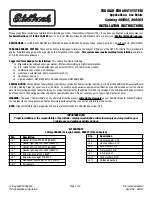
WARNINGS
information is not found on these labels
then you should contact your authorized
dealer as soon as possible. Use of any tire
or wheel not recommended by Ford can
affect the safety and performance of your
vehicle, which could result in an increased
risk of loss of vehicle control, vehicle
rollover, personal injury and death.
Additionally the use of non-recommended
tires and wheels could cause steering,
suspension, axle, transfer case or power
transfer unit failure. If you have questions
regarding tire replacement, contact your
authorized dealer as soon as possible.
To reduce the risk of serious injury,
when mounting replacement tires
and wheels, you should not exceed
the maximum pressure indicated on the
sidewall of the tire to set the beads without
additional precautions listed below. If the
beads do not seat at the maximum
pressure indicated, re-lubricate and try
again.
Important:
Remember to replace the
wheel valve stems when the road tires are
replaced on your vehicle.
The two front tires or two rear tires should
generally be replaced as a pair.
The tire pressure sensors mounted in the
wheels are not designed to be used in
aftermarket wheels.
The use of wheels or tires not
recommended by Ford Motor Company
may affect the operation of your tire
pressure monitoring system.
If the tire pressure monitoring system
indicator is flashing, the system is
malfunctioning. Your replacement tire
might be incompatible with your tire
pressure monitoring system, or some
component of the system may be
damaged.
Safety Practices
WARNINGS
If your vehicle is stuck in snow, mud,
or sand, do not rapidly spin the tires;
spinning the tires can tear the tire
and cause an explosion. A tire can explode
in as little as three to five seconds.
Do not spin the wheels at over
56 km/h. The tires may fail and injure
a passenger or bystander.
Driving habits have a great deal to do
with your tire mileage and safety.
*Observe posted speed limits
*Avoid fast starts, stops and turns
*Avoid potholes and objects on the road
*Do not run over curbs or hit the tire
against a curb when parking
Highway Hazards
No matter how carefully you drive there’s
always the possibility that you may
eventually have a flat tire on the highway.
Drive slowly to the closest safe area out of
traffic. This may further damage the flat
tire, but your safety is more important.
If you feel a sudden vibration or ride
disturbance while driving, or you suspect
your tire or vehicle has been damaged,
immediately reduce your speed. Drive with
caution until you can safely pull off the
road. Stop and inspect the tires for
damage. If a tire is under-inflated or
damaged, deflate it, remove wheel and
replace it with your spare tire and wheel.
If you cannot detect a cause, have the
vehicle towed to the nearest repair facility
or tire dealer to have the vehicle inspected.
252
Ranger (), EB3B-19G219-ZAB enAUS
Wheels and Tires
















































